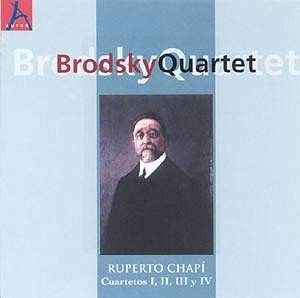Ruperto
Chapí was the chameleon of 19th century Spanish music.
Best known for his highly popular zarzuelas, operas and orchestral
suites such as the Fantasía morisca and Los gnomos
de la Alhambra, his greatest gift was to synthesise diverse
influences and styles into attractive pieces more remarkable for
energy and compositional skill than for individuality. Maybe we're
too prone to praise innovators, leaders rather than consolidators
of fashion. Certainly few composers wear borrowed clothes with
Chapí's ingenuity or aplomb. Then again, intelligence,
wit and imagination are rare enough commodities; and whatever
his limitations, the composer of great zarzuelas of the quality
of La revoltosa or La bruja had enough of those
and to spare.
The
reputation of these String Quartets, written late in Chapí's
career, has intrigued those of us who know him almost exclusively
through his zarzuelas. By 1903, when No.1 was written for the
Cuarteto Francés, much of his best stage work was behind
him; but judging from contemporary reaction - as reported both
in Luis G. Iberni's sleeve-note here, and his authoritative study
of Chapí's life and work - the Quartets excited and divided
critical opinion to an unexpected degree.
Thanks
to the Brodsky Quartet we finally have the chance to find out
what it was that made madrileño music lovers a century
ago sit up and take notice. Chapí's foray into a genre
which, since the time of Haydn, has been the chosen vessel for
the deepest thoughts of so many great and not-so-great composers
must have come as a surprise. Even so, in their consciously Beethovenian
ambition, their virtuosity and unpredictable alternation of sun
and shade, they do come as something of a revelation.
Chapí
was not of course the first stage composer to try his hand at
a String Quartet. In No.1, Verdi's sole example comes to mind
by reason of Chapí's comparably assured technique and focus.
Like the Italian, he is content to take the expressive possibilities
of the form as he finds them, but arresting gestures, good tunes
and theatrical contrasts keep us highly entertained throughout
the work, which culminates in an energised Finale combining zortzico
and jota rhythms. The whole may not equal the sum of the
parts, but this is living music, mainstream European in language
but - unlike his rival Tomás Bretón's more sombrely
classical chamber pieces - recognisably Spanish in accent.
Its
successors share No.1's four-movement structure as well as its
boldness and fire. No.2, written for the Czech Quartet - Josef
Suk on second violin and Oscar Nedbal on viola - is more nationalist
in tone. It begins with some delicate alhambrismo, Aida
embracing Thaïs in a poetic Andalusian nocturne. The later
movements, with their unpredictable tonal shifts, are equally
attractive, witty and elusive, even if the pizzicato ostinato
of the third movement is a little too obvious an exercise in Beethovenian
bizarrerie.
The
brooding first movement of the more classically compact No.3 is
Franckian in feeling, whilst the epicurean melancholy of the Larghetto
recalls early Debussy - though the pulsing Allegro finale,
thematically integrated with the earlier movements, is much more
Mediterranean in temper. The harmonic simplicity of No.4 initially
strikes a contrasted pose, Dvořákian in melodic cut, easy
amplitude and harmonic procedures. Its urbane Allegretto
is interrupted by a surprisingly morose, world-weary lento,
stamping a more personal dimension on a work otherwise richer
in romantic suavity than depth of feeling.
It
would be folly to pretend that the rediscovery of Chapí's
Four rewrites the established order of the String Quartet. Intelligently
varied, well stocked with musical and technical interest, their
very diversity works against a compelling sense of emotional through-line
- at this level underlying personality does count, and they owe
much to Beethoven and his successors. Again, they are ambitiously
structured, and despite Chapí's easy formal grasp some
movements are thematically lightweight enough to feel overlong.
No matter. This is music which gives a deal of pleasure, plenty
of food for thought, music which is always alive, music for which
it is impossible not to feel growing affection, even love.
The
Brodsky Quartet convey the spirit of these underrated works superlatively
well. Their virtuosity is impressive, and technical challenges
are generally well met. Their alertness and sensitivity to Chapí's
quicksilver moods is unfailing, and they convey a freshness which
adds greatly to the pleasure of this rediscovery. The clear, unfussy
recording is another plus.
Which
makes it all the more stupid that nobody - neither the production
company Autor, nor the Quartet's own online sales outlet - seems
to care enough about this important issue to offer any distribution
outside Spain, even in the Brodskys' native UK. After a century
of undeserved neglect, Chapí's String Quartets - and the
Brodskys themselves - deserve a better deal.
Christopher
Webber
